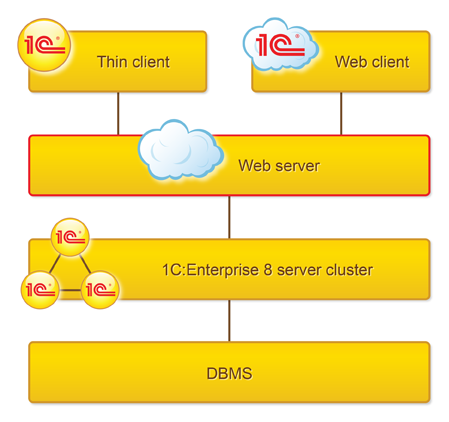An Internet connection provides users with online access to Infobases through a client application (thin client or web client). The client application connects to a web server, which communicates with a 1C:Enterprise cluster or a file Infobase.
Client/server mode

File mode

Applied solutions do not require any modification to work over the internet. Both the thin client and the web client provide a 1C:Enterprise interface on the user's computer.
The thin client and the web client differ in the following ways:
- The thin client must be installed on the user's computer, while the web client does not need to be installed.
- The thin client provides access to full platform functionality, while the web client does have some limitations.
- The thin client runs on a Windows or Linux computer, while the web client runs in a browser window. Therefore, web client users also have the following options:
- computer with Mac OS X (Safari browser);
- iPad with Apple iOS (Safari mobile browser).
- There are some ergonomic differences between the thin client and the web client.
Client applications can connect to the web-server using HTTP or HTTPS, which supports the encryption of transferred data.
Low connection speed mode
Client applications support a variety of Internet connection methods, such as high-bandwidth dedicated lines, LAN, or low-speed channels like mobile GPRS.
For low-speed channels, the thin client and the web client employ the low connection speed mode, which provides reasonable application performance.
Thin client distribution kit
To address the needs of users who work over the Internet, a distribution kit containing only the 1С:Enterprise platform thin client is available.
This distribution kit is small in size and is therefore easily downloaded regardless of available bandwidth.
The platform supports automatic download (using HTTP) and installation of the thin client if the current thin client version is different from the 1C:Enterprise server version.
Other remote access modes
In addition to direct connection to the infobase from client applications, the platform supports other remote access modes. To use these modes, you have to modify your applications or develop new ones. These modes mostly do not support real-time data processing or support it with a limited set of features only.
- Web services
The web service functionality provides applied solutions with SOA (Service-Oriented Architecture) support. SOA is a modern standard of integration between applications and information systems. It provides applications with the option to publish their functionality online as a set of web services. At the same time, applications can use web services published by third-party vendors.
- Web extension for connecting to Infobases
The web extension is a platform component. It allows you to write web applications capable of interacting with 1C:Enterprise Infobases. The interaction can be implemented as direct user access to Infobase data through a web interface, which is similar to the 1C:Enterprise interface. It also can be implemented by adding 1C:Enterprise applied functionality to a website or by providing options for software-based access to 1C:Enterprise from third-party systems.
- Offline data exchange in distributed information systems
The data exchange functionality allows scheduled replication of data and configuration changes between distributed system nodes. Both 1C:Enterprise Infobases and third-party systems can serve as distributed system nodes.
See also:

